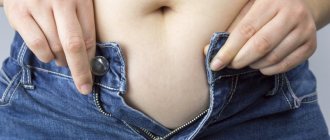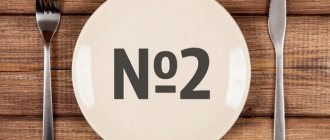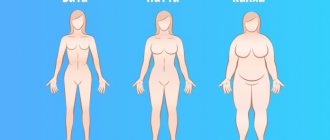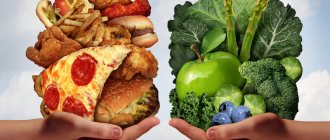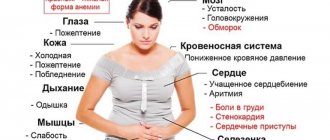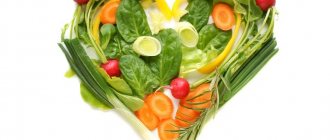Personal experience of losing weight Where do fat people come from Water for health Cleansing the body of toxins is a myth Causes of excess weight Losing weight without harm to health Mistakes of losing weight How to lose weight without dieting How to lose weight quickly How to get rid of cellulite Ways to lose weight Table of height and weight ratio Separate nutrition FOR SWEET LOVERS! Wraps for weight loss Fasting days How to prepare your figure for the beach season How Ksenia Borodina lost weight Herbs for weight loss Therapeutic fasting How to remove fat from the abdomen and sides A weight loss technique that is safe for health Let's understand the reasons for overeating Lose weight by the New Year at any cost Exceeding the optimal body weight is the main reason development of diseases Lose weight while sleeping - dreams come true! Slimming shapewear for women How to eat healthy How to get rid of stretch marks on the skin Weight loss without secrets and excesses Health and slimness at the same time The path to an ideal figure: necessary knowledge Questionable ideals How to make a woman's figure slim Cellulite: the truth, the truth again and nothing but Give yourself a gift slimness Lose weight with pleasure Psychological hunger as a cause of excess weight What is “food addiction” and how to deal with it “Work blister”: dignity or extra burden? Interesting and unusual ways to get rid of excess weight How to re-educate your appetite How to gain missing body weight The Yo-Yo effect or why it is so difficult to lose weight Quick weight loss after childbirth How to tighten saggy skin after losing weight Down with fat! How to make your cheeks lose weight How to get rid of obesity How to lose 6 kg in 2 weeks Principles of impulse nutrition Do you want beauty? Get off! Metabolism and weight loss. How to speed up metabolism? Psychology of weight loss GET RID of excess belly fat I remain slim after a stormy feast Help your daughter lose weight Pepper patch against cellulite Lose weight without suffering Losing weight like a man How to reduce the size of your belly Paraffin therapy is an effective method of combating stretch marks! Choosing an EFFECTIVE ANTI-CELLULITE cream How to lose weight by manipulating your eating behavior An adequate way to lose weight Easy ways to burn calories Emergency measures for rapid weight gain Weight control What is a raw food diet and how to become a raw foodist The path to losing weight through accepting your own weight What is losing weight first What is visceral fat Massage for weight loss Breathing for weight loss How many kilograms will you lose PERSONAL EXPERIENCE: The story of one successful weight loss Personal experience and recommendations The secret of my great-grandmother - how to look stunning We lose weight not very quickly, but significantly Technology leads to weight gain
NON-STANDARD WAYS TO LOSE WEIGHT:
“Slim Up” technology: lose weight while lying down! 25 frame for weight loss
PREGNANCY:
Bust problems after childbirth - ways to prevent them Healthy diet after childbirth How to lose excess weight during breastfeeding Breastfeeding and losing weight
CHILDREN:
A beautiful figure in the hands of parents How beneficial is vegetarianism for a child
? There were six rules for losing weight.
They are simple.
Follow them, and the result will not be long in coming.
All about obesity
On a note
Obesity is the excess accumulation of fat in the body, which leads to changes in metabolism and organ function.
Diabetes mellitus, hypertension, cardiovascular pathologies are direct consequences of excess weight.
To determine the degree of obesity, body mass index is calculated. An index of 18 to 25 kg/m² is considered the norm.
- If the BMI is from 30 to 35, it is the first degree of obesity.
- With a BMI from 35 to 40 - second degree.
- With a BMI over 40 - third and fourth degree.
Many diets have been developed to treat obese patients. Before changing your diet, consult your doctor and figure out what caused your excess weight.
How to diet correctly
Almost everyone who decides to lose weight goes on a diet. Now there are a huge number of recommendations on nutrition, or, rather, on its restriction. But most of the diets that flood the Internet and are passed on by word of mouth are not at all safe and are often downright harmful.
Many diets have two unpleasant consequences. The first is the return of excess weight (even with supplementation) after stopping the diet. This happens especially often after rapid weight loss. The second consequence is much more serious: the human body begins to suffer from a deficiency of various essential elements that it is not able to synthesize on its own in the required quantities. The result of many diets is hypovitaminosis and vitamin deficiencies, chronic dehydration, and micronutrient deficiency.
One of the most popular diets is ordinary fasting.
, when the caloric intake of food is reduced simply by almost completely eliminating the food itself. At the same time, a person tries not to eat for as long as possible during the day, and only when it becomes completely unbearable does he allow himself to have a light snack. This is absolutely wrong. Fasting is dangerous if you resort to it often and for a long time. All kilograms lost in this way usually return quickly, but the stress that the body experiences can lead to the rapid development of complications (existing chronic diseases worsen, or new ones appear). Unsystematic fasting causes a lack of a large number of different nutrients at once with corresponding manifestations (weakness, fatigue, nervousness, poor sleep, muscle cramps, deterioration of color and decreased skin tone).
Another popular type of diet is mono-diets
.
These include kefir diet
, as well as
buckwheat, rice
and other diets. They all suggest satisfying hunger with one type of food - drinking only kefir for a day or eating unsalted porridge. Such a diet for several days leads to a lack of vitamins (primarily B vitamins) and other water-soluble substances, as well as ions.
Vegetarianism
, or giving up meat products, is used not only for weight loss, but also as a permanent way of life.
If you prefer a vegetarian menu, then you are at risk for iron deficiency anemia and a lack of essential amino acids. Therefore, with a vegetarian lifestyle, especially at the initial stage, when you are still selecting and mastering a new menu, monitoring the level of iron
and
calcium in the plasma
, as well as
protein
and
blood lipids
, can help to early detect a lack of certain substances and change something in the diet.
The law of proper diet says:
“The body must regularly receive the required amount of vitamins, microelements, amino acids, as well as enough fluid.”
By following certain rules, you can make the weight loss process no less effective and much more harmless to the body.
Principles of diet for obesity
- Gradually and consistently reduce the number of calories you consume. On average, the daily caloric intake will have to be reduced by 500-1000 kcal.
- Control the balance of the BZHU. Try to ensure that approximately 55% of all incoming substances are slow carbohydrates.
- Be sure to add protein mixtures to your diet to provide your body with the right amount of protein.
- Reduce the amount of fat you consume to 30% and carefully monitor its quality, because not all fatty foods are equally healthy. Cheeses, sausages, smoked meats, sweets and ice cream contain hidden fats, which many people forget about when calculating BJU.
- Be sure to eat small portions, but often. The optimal number of visits to the refrigerator per day is six. One serving should contain enough food to feel full, but not hungry or heavy in the stomach. Over time, you will learn to visually determine the amount of food that satisfies your body's needs.
Rule 2: Reduce portions
The best way to get rid of extra pounds is to leave them on your plate.
Take yourself a smaller portion than what you are used to. For example, half. And do without the additive. To speed up satiety, exclude foods and seasonings that stimulate your appetite.
There is a genetic reason why we overeat more and more every year: the body's need for food decreases with age, but the habit of certain portions remains. Therefore, even without increasing our food intake, we actually overeat more and more every year. And, therefore, we gain weight.
A decrease in physical and emotional stress also has an effect. As we age, we stop playing sports, and, having acquired skills, we spend less energy on performing professional duties.
The experience of many, including the author, has shown that to maintain an active life it is enough to eat half as much as we usually consume. You just need to get used to eating less. Eating a little is a good habit, eating a lot is a bad habit . Having realized this, you become familiar with the views and way of life of the people who make up the color of the nation.
The great commander Suvorov said: Keep your stomach hungry - and you will be healthy.
Ballerina Maya Plisetskaya , a superb dancer despite her advanced age, said this: I always want to eat . I just got used to not paying attention to it. The famous singer Galina Vishnevskaya , when asked how she manages to maintain excellent shape, answered, although rather rudely, but very intelligibly: You need to eat less! That is, limiting herself in food is a common thing for her.
Eating less will make you hungry sooner. In order not to suffer, you will have to refresh yourself again. It turns out that instead of 3-4 meals a day you will have 5-6 (which, by the way, is also recommended by nutritionists). But with half portions, the total number of calories will still be less.
What can you eat on diet number 8?
- Bread – Dried (up to 150 g per day)
- Soups – Vegetable broth soups, weak broths made from lean meat
- Meat – Lean beef, rabbit, fat-free chicken, boiled or stewed
- Fish – Lean fish, boiled or steamed, seafood
- Vegetables – Cabbage, leafy vegetables, radishes, cucumbers, tomatoes, greens – raw or baked, seaweed
- Cereals and Legumes – Cereals, beans or lentils as sources of essential amino acids (instead of bread)
- Eggs – Boiled, steamed
- Dairy product – Low-fat milk, kefir, yogurt, cottage cheese
- Fruits – Sour and sweet and sour varieties of fruits and berries (up to 200 g per day)
- Drinks – Coffee or tea without sugar, juices from sour fruits and berries, mineral water
- Fats – Butter and vegetable oil – 20 g per day as part of meals
Is it possible to lose extra pounds in 30 days?
Losing weight in a month is quite possible. Some people lost up to 10 kg of excess weight in 30 days. But such extreme weight loss is harmful and dangerous to health. Since results are achieved through starvation diets.
In addition, most of the weight lost is not fat at all, but water and muscle. During this period, the skin does not have time to contract, it sags and becomes flabby. And the face takes on a haggard appearance. General health also worsens, irritability and anger appear, and constant fatigue appears. And the main thing is that when you return to a normal diet, all the lost kilograms quickly come back.
The recommended rate of weight loss is 4-5 kg per month. Sometimes you can lose 10 kg without harm. But this is if the initial weight is too large. At this rate, weight loss is achieved precisely by burning fat.
At the same time, the skin has time to shrink, and the body becomes elastic. Volumes are noticeably decreasing. Well-being improves, appetite decreases, performance increases. There is a desire to lose weight further.
What not to eat on diet number 8
- Bread – Butter pastries
- Soups – Meat, fish and mushroom, all strong broths
- Meat – Pork, goose, duck, lamb, fatty chickens, all smoked meats and sausages
- Fish – All fatty varieties, smoked or fried
- Vegetables – Potatoes, beets, carrots and other high glycemic index vegetables
- Pasta – Pasta
- Eggs – Fried omelettes or fried eggs
- Dairy product – Hard cheeses, margarine, sour cream, full-fat milk and cream
- Fruits – Sweet fruits with a high glycemic index
- Drinks – Compotes, jellies and nectars with sugar, sweet soda, sweet juices
- Fats – Lard, margarine, spreads
Products are boiled, steamed, stewed, baked with a minimum amount of added fat.
Use as many fresh and cooked vegetables and fruits as possible, as they contain high levels of vitamins and fiber, which helps with bowel function.
You can get more complete and detailed information about diet for obesity from your doctor. He will also give recommendations and select the optimal diet in accordance with the individual needs of the body.
On a note
Remember to combine dietary restrictions with physical activity. They will help speed up metabolism, strengthen muscles, and lose weight faster.
Reasons for weight gain
The main principle of losing weight is to spend more calories than you consume in food per day. Specific numbers are individual, it all depends on your physical activity, weight, age, height. Experts say that a 30-year-old person needs to consume about 2 thousand calories per day. That is, it is enough to reduce this number to start losing weight.
What is the cause of weight gain? Perhaps you don't know how to:
- Distribute proteins, fats and carbohydrates in your daily diet. That is, you need to clearly understand what you can eat for breakfast and what for dinner.
- Choose products. It is preferable to purchase minimally processed products (for example, meat instead of minced meat).
- Losing excess weight through diet is irrational without exercise. Only a set of measures will allow you to get a slim, but at the same time toned body.
Therapeutic diet menu No. 8 for obesity
- Breakfast - a protein omelet made from one egg, a small piece of whole grain bread, oatmeal or buckwheat porridge with low-fat milk. Coffee black or with milk without sugar.
- Second breakfast - natural yogurt without sugar, apple.
- Lunch - vegetable soup, boiled or baked fish/meat/chicken. Boiled vegetables: broccoli, green peas. Two slices of grain bread. Tea without sugar.
- Afternoon snack - dietary cottage cheese, 3-4 nuts, orange, rosehip decoction.
- Dinner – vegetable stew without potatoes and boiled fish or low-fat poultry, a slice of bread. Herb tea.
- At night - kefir.
Calculation of calorie intake to create an individual diet
Calculating the optimal amount of calories is easy.
There are simple calculation formulas. You can use an online calculator.
Your diet plan should be drawn up taking into account the calculation of calories OO - basal metabolic rate. This is the number of calories the body needs to maintain functions at rest (breathing, pumping blood, growing the nail plate).
Formula for calculating OO:
9.99*weight, kg + 6.25*height, cm - 4.92*age - 161.
Next, the daily calorie intake is calculated based on the degree of physical activity:
- Lack of stress, passive lifestyle - OO*1.2.
- A small degree of physical activity, when training is present from 1 to 3 times a week - OO * 1.375.
- Average degree of activity, sports are present from 3 to 5 times a week - OO*1.55.
- Sports every day - OO*1.725.
- If the intensity of physical activity is high - OO*1.99.
By calculating, you can get your daily caloric intake to maintain a stable weight.
To lose weight, you need to reduce the number of calories by a maximum of 30%.
It is necessary to reduce caloric intake gradually.
For example:
- 1 week reduce by 5%;
- Reduce week 2 by 10% and so on.
- You cannot sharply reduce the number of calories.
Motivators for losing weight
How to go on a diet? Effective psychological tools will help you decide to take on a multi-day test. Diet motivators:
- You need to decide why losing weight is important. Everyone has their own reason.
- Choose your pace of weight loss.
- Be patient.
- Give your body physical activity.
- Find support from loved ones.

